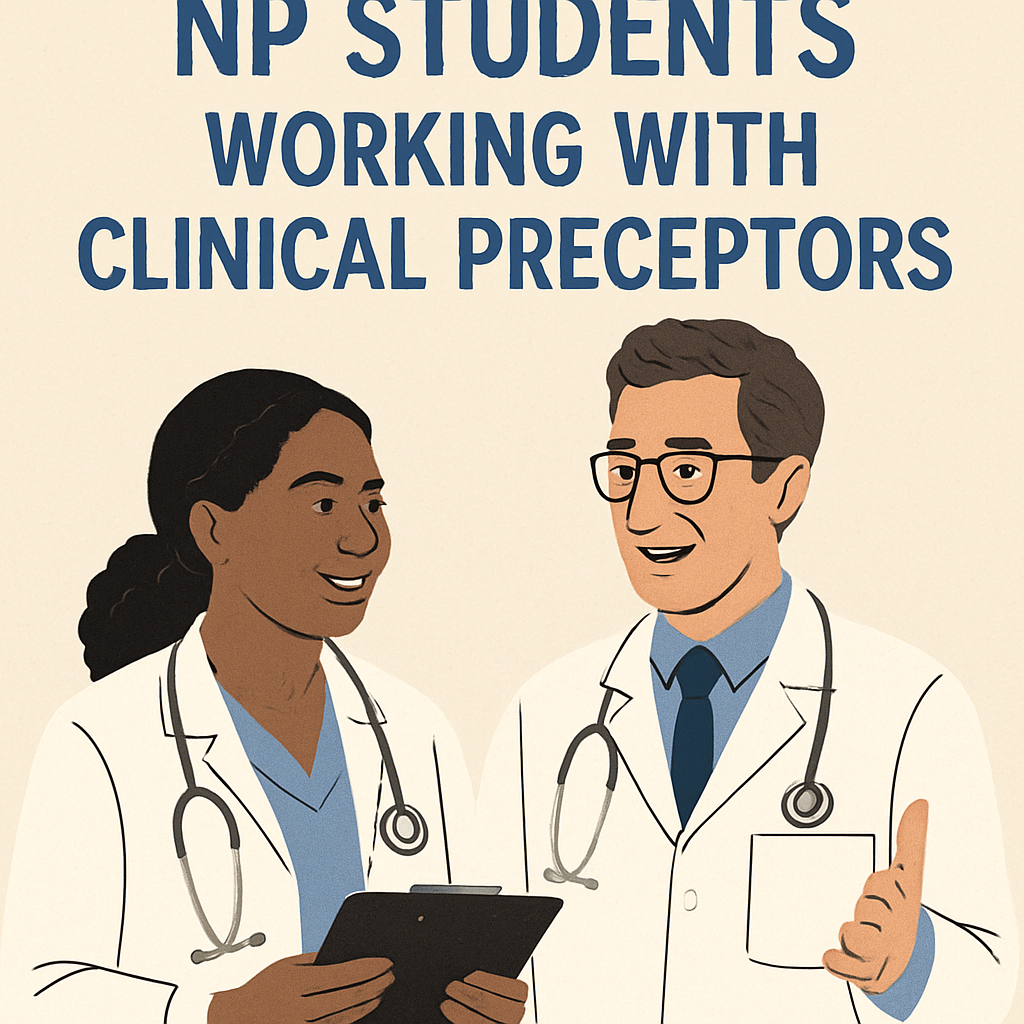Essential Tips for NP Students Working with Clinical Preceptors
Introduction
If you’re about to begin your first nurse practitioner clinical rotation, you’re in for a treat. Think of your preceptor as your trusty sidekick in this superhero journey of advanced practice nursing. They are the Yoda to your Luke Skywalker, guiding you through the complexities of patient care and clinical decision-making.
The relationship you build with your preceptor is not just about ticking off boxes for your NP student clinical experience; it’s about mentorship that shapes your future as a healthcare provider. This isn’t just any old internship; it’s a nurse practitioner internship guidance experience that can set the tone for your entire career.
But let’s be real this journey isn’t all sunshine and roses. You might encounter challenges, misunderstandings, or even the occasional awkward moment (like when you forget how to pronounce “hypertension” in front of a patient). Fear not! With the right tips and tricks up your sleeve, you’ll navigate these waters like a pro.
In this blog post, we’ll explore essential strategies for working effectively with your advanced practice nurse preceptor. From finding the right fit during NP student placement to maximizing hands-on training opportunities, we’ve got you covered. So grab your stethoscope and let’s dive into the nitty-gritty of clinical education for nurse practitioners!

Understanding the Role of a Preceptor
So, what exactly is a nurse practitioner preceptor? Think of them as your clinical GPS they help navigate the often winding roads of your nurse practitioner clinical rotation. A preceptor is an experienced advanced practice nurse who takes on the responsibility of guiding NP students through their clinical experiences. They are not just there to supervise; they are mentors, teachers, and sometimes even cheerleaders!
The importance of the preceptor role in nursing education cannot be overstated. These seasoned professionals provide invaluable real-world experience for NP students, bridging the gap between theoretical knowledge and practical application. They help foster growth in NP students through preceptorships, ensuring that you not only understand how to treat patients but also how to navigate the complexities of healthcare settings.
Did you know? Studies show that effective clinical mentorship significantly boosts NP student confidence and competence during their training!
Preceptors vs. Other Clinical Supervisors
Now, let’s clear up a common misconception: preceptors are not just another pair of eyes watching you perform your duties. Unlike other clinical supervisors who may focus solely on evaluation or administrative tasks, preceptors engage deeply with NP students’ learning processes. They offer personalized feedback and guidance tailored to your individual needs, which is crucial for your nurse practitioner training.
- Preceptors: Provide hands-on training and mentorship.
- Other Supervisors: Often focus on compliance and procedural oversight.
Your relationship with a preceptor can make or break your NP student clinical experience. A good preceptor will not only teach you skills but also inspire you to develop critical thinking and problem-solving abilities in real-time situations. This is where mentoring future nurse practitioners becomes a rewarding endeavor for both parties involved.
Finding the Right Clinical Preceptor
Finding the right nurse practitioner student preceptor can feel like dating in college you’re looking for someone who matches your vibe, understands your goals, and can guide you through the ups and downs of your clinical rotation. But fear not! With a little strategy and some insider knowledge, you can find that perfect match.
Utilizing Clinical Match Me for NP Student Placement
First off, let’s talk about the magic of Clinical Match Me. This platform takes the stress out of finding a preceptor by connecting you with experienced professionals who are eager to mentor future nurse practitioners. Think of it as your personal matchmaking service for nurse practitioner clinical rotations minus the awkward first date!
Criteria for Selecting a Suitable Preceptor
Now that you’re ready to dive into the search, here are some key criteria to consider:
- Experience Level: Look for preceptors with ample experience in your area of interest. This is crucial for getting quality NP student preceptorship.
- Teaching Style: Some preceptors are hands-on while others prefer a more observational approach. Choose one whose style aligns with how you learn best.
- Availability: Ensure they have enough time to dedicate to mentoring you during your nurse practitioner training. You don’t want a preceptor who’s too busy to give you proper NP student supervision!
- Cultural Fit: A good rapport can make all the difference. Look for someone whose values align with yours, especially when guiding nurse practitioner students in clinics.
The Importance of Alignment in Clinical Interests and Goals
Your clinical interests should resonate with those of your preceptor. If you’re passionate about pediatrics but end up with an adult medicine guru, it might lead to a mismatch that leaves both parties feeling unfulfilled. It’s like trying to mix oil and water just doesn’t work!
Key Takeaway: Finding a suitable preceptor is essential for maximizing your NP student clinical experience. Use platforms like Clinical Match Me, focus on compatibility in teaching styles and interests, and ensure they have time to invest in your growth.

The right fit not only enhances your learning but also sets the stage for successful real-world experience as you transition from NP student to practicing nurse practitioner. So get out there, explore options, and find that perfect clinical mentor who will support your journey into advanced practice nursing!
Building a Strong Relationship with Your Preceptor
Building a strong relationship with your nurse practitioner student preceptor is like crafting a fine wine it takes time, patience, and the right ingredients. You want to create a partnership that not only enhances your NP student clinical experience but also fosters mutual respect and growth. Here are some tips to help you cultivate that vital connection.
Effective Communication Strategies
Communication is the secret sauce in any relationship, especially when it comes to your preceptor. Here are some strategies:
- Be proactive: Don’t wait for your preceptor to reach out. Initiate conversations about your learning goals and areas where you feel you need more support.
- Listen actively: When your preceptor shares feedback or insights, listen as if they’re imparting the secrets of the universe because, in many ways, they are!
- Ask questions: If something isn’t clear, don’t hesitate to ask for clarification. Questions show engagement and a desire to learn.
Setting Expectations Early On
The early bird might get the worm, but the early communicator gets the best mentorship! Setting expectations from day one can prevent misunderstandings down the line:
- Discuss goals: Share what you hope to achieve during your clinical rotation. This sets a clear roadmap for both of you.
- Outline responsibilities: Clarify what you’ll be doing and what your preceptor expects from you. No one likes surprises in their clinical rotation!
- Create a feedback loop: Establish how often you’ll check in about progress and areas for improvement. Regular feedback is like fuel for your growth.
The Importance of Feedback in the Mentorship Process
Your relationship with your preceptor should be an evolving dialogue rather than a one-way street. Feedback is crucial here!
- Acknowledge feedback: When your preceptor provides constructive criticism, thank them! It shows maturity and readiness to learn.
- Simplify self-assessment: After receiving feedback, take time to reflect on it and assess how you can implement changes effectively.
- Cultivate an open environment: Encourage your preceptor to share their thoughts candidly by demonstrating that you value their input.
A strong relationship with your nurse practitioner clinical rotation preceptor will not only enhance your practical training but also pave the way for future opportunities in advanced practice nursing mentorship. So roll up those sleeves and get ready to engage your future self will thank you!
Navigating Challenges During Your Clinical Rotation
Ah, the clinical rotation a rite of passage for every nurse practitioner student. It’s like being thrown into the deep end of a pool without knowing how to swim. But fear not! With the right strategies, you can navigate these waters like a pro.
Common Challenges Faced by NP Students in Clinical Settings
First off, let’s talk about some of the challenges that might make you feel like you’re stuck in quicksand:
- Communication Barriers: Sometimes, your preceptor might speak fluent medical jargon while you’re still learning the lingo.
- Time Management: Balancing patient care, documentation, and learning can feel like juggling flaming swords.
- Feedback Overload: Receiving feedback is crucial, but too much can leave you overwhelmed and questioning your abilities.
- Cultural Differences: Working with diverse patient populations and clinical staff may present unique challenges.
Tactics for Addressing Conflicts with Preceptors or Clinical Staff
If conflicts arise (and they will), here’s how to tackle them head-on:
- Stay Calm: Approach conflicts with a level head. Remember, you’re all on the same team even if it doesn’t feel that way at times.
- Communicate Openly: Discuss your concerns directly with your preceptor. They might not even realize there’s an issue!
- Acknowledge Their Expertise: Validate their experience and insight before presenting your point of view. It’s all about mutual respect.
- Document Everything: Keep records of interactions that seem contentious. This way, you have evidence if things escalate.
Seeking Additional Support When Needed
If you’re feeling lost in the clinical jungle, don’t hesitate to reach out for help!
- Mentorship Programs: Many schools offer resources where experienced NP students can guide you through tough spots.
- Peer Support Groups: Connect with fellow NP students facing similar challenges. Remember, sharing is caring!
- Faculty Advisors: Don’t shy away from consulting faculty members who can offer guidance and reassurance during tough times.

Takeaway: Navigating challenges during your nurse practitioner clinical rotation is part of the learning curve. Embrace these experiences as opportunities for growth and development!
Maximizing Your Learning Experience with Hands-On Training
As a nurse practitioner student , you’re not just sitting in a classroom, sipping coffee while memorizing textbooks. Oh no! You’re diving headfirst into the thrilling world of clinical practice. This is where the magic happens, and hands-on training becomes your best friend.
The Significance of Experiential Learning for NP Students
Experiential learning is like that secret sauce that transforms bland spaghetti into a gourmet meal. It’s all about getting your hands dirty literally and figuratively. When you engage directly with patients and clinical situations, you’re not just learning; you’re living it!
Did you know? Studies show that students who participate in hands-on training during their nurse practitioner clinical rotation retain information up to 75% better than those who rely solely on traditional learning methods.
Tips for Actively Engaging During Clinical Rotations
- Ask Questions: Don’t just nod along like a bobblehead. If something piques your curiosity, ask away! Your preceptor will appreciate your eagerness to learn.
- Take Initiative: Volunteer for tasks, whether it’s taking patient histories or assisting in procedures. Show that you’re ready to jump in and contribute.
- Reflect on Experiences: After each shift, take a moment to think about what went well and what could be improved. This self-assessment is crucial for growth.
Documenting Your Clinical Experiences Effectively
Your clinical experiences are golden nuggets of knowledge, so make sure to document them! Keep a detailed log of cases you encounter, skills you practice, and feedback from your preceptor. This isn’t just busywork; it’s preparing your future self for interviews or even future clinical placements.
A well-kept record can also help you identify patterns in your learning journey like recognizing which areas need more focus or which skills you’ve mastered. Plus, it’s an excellent conversation starter when discussing your NP student mentorship with potential employers!
A Common Misconception: Hands-On Training is Just Shadowing
Many NP students mistakenly think that hands-on training is merely shadowing their preceptor. While observing is beneficial, truly maximizing your experience means getting involved! Don’t be the wallflower at this party dance!
The more actively involved you are in patient care and clinic operations, the more prepared you’ll be for real-world challenges as an advanced practice nurse.
Your Takeaway
Dive into those hands-on opportunities during your rotations! Embrace every chance to learn through action rather than observation alone. This approach will not only enhance your skills but also foster growth in yourself as an emerging healthcare professional.
Remember: The journey to becoming an effective nurse practitioner isn’t just about hitting the books; it’s about engaging with real patients and real situations under the guidance of an awesome preceptor!
The Importance of Professionalism and Ethics in Clinical Practice
As a nurse practitioner student, your journey through clinical rotations is not just about acquiring skills; it’s also about embodying the principles of professionalism and ethics. Think of it as your superhero origin story, where you learn to don the cape of integrity while navigating the complex world of healthcare.
Dressing for Success
First impressions matter. Dressing appropriately in clinical settings is not just about looking sharp; it’s a reflection of your respect for the profession and your patients. Imagine walking into a clinic in scrubs that look like they’ve survived a food fight not exactly confidence-inspiring, right? Aim for clean, well-fitted attire that communicates professionalism and readiness.
Navigating Ethical Dilemmas
During your nurse practitioner clinical rotation, you may encounter ethical dilemmas that test your values and decision-making skills. Whether it’s dealing with patient confidentiality or informed consent, having a solid grounding in ethics will guide you through these murky waters. Remember, ethics isn’t just a textbook topic; it’s about making real-world decisions that impact lives.
The Role of Integrity
Integrity is like the glue that holds everything together in the healthcare setting. Building trust with your preceptor and patients hinges on being honest and transparent. If you make a mistake (and let’s be real, we all do), own up to it! This honesty fosters an environment where learning can thrive plus, it shows your preceptor that you’re serious about becoming an advanced practice nurse.
In conclusion, as you embark on this exciting chapter of your nurse practitioner training, remember that professionalism and ethics are more than just guidelines they are essential to fostering growth in yourself and those around you. So go ahead, put on those scrubs with pride!

Conclusion: Preparing for a Successful Career as a Nurse Practitioner Student Mentor and Beyond
As you wrap up your journey through nurse practitioner clinical rotations, it’s essential to think beyond just passing your exams. The time you spend with your nurse practitioner preceptor is not only about learning clinical skills; it’s also about laying the groundwork for your future role as a preceptor yourself. You see, the world of nursing is cyclical today’s students are tomorrow’s mentors.
Engaging in NP student mentorship can be incredibly rewarding. Think of it as being the Obi-Wan Kenobi to a young Padawan. You’ll have the chance to share your knowledge, provide guidance, and help shape the next generation of nurse practitioners. But before you throw on that mentor cape, here are some key points to consider:
- Reflect on Your Own Experiences: What did you wish you had known when you were just starting? Use those insights to guide your future mentees.
- Stay Updated: The field of advanced practice nursing is always evolving. Keep abreast of new practices and technologies so you can provide relevant information.
- Foster an Open Environment: Create a safe space for discussion where NP students feel comfortable asking questions and expressing concerns.
- Encourage Critical Thinking: Rather than providing all the answers, guide them through problem-solving processes. This builds confidence and independence.
Navigating Your Preceptorship Experience
The relationship with your preceptor during clinical rotations is vital for your development as an advanced practice nurse. Seek out opportunities to learn from their experiences while also sharing what you’ve learned in school. This two-way street not only enhances your clinical education but also prepares you for the role of an advanced practice nurse preceptor down the line.
The Importance of Networking
Your time as an NP student is also about building connections within the healthcare community. Attend workshops, join professional organizations, and engage with other healthcare professionals. These relationships can lead to future opportunities think internships or even job placements after graduation!
In summary, preparing for a successful career as a nurse practitioner isn’t solely about mastering clinical skills; it’s equally about understanding the value of mentorship and building strong professional relationships. So go ahead embrace your role as both a learner now and a mentor in the future! Your journey is just beginning.






Comments are closed